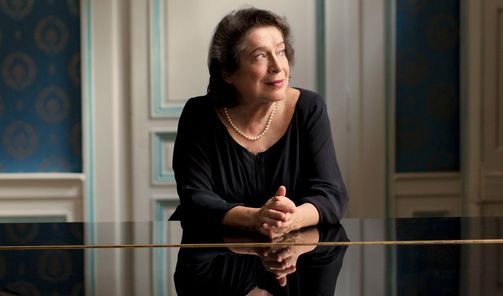
Advertisement
---SCROLL DOWN FOR ENGLISH VERSION---BRAHMS: II. (B-dúr) zongoraverseny, op. 83
-szünet-
BRAHMS: IV. (e-moll) szimfónia, op. 98
Közreműködik: Elisabeth Leonskaja zongora
Concerto Budapest
Vezényel: Keller András
„Szereti Brahmsot?” – kérdezhetnénk Françoise Sagan híres regényének címével. A francia írónő művében nem éppen a német romantikus zeneszerző játssza a főszerepet, a Concerto Budapest négy hangversenyén azonban annál inkább, ezért is invitálunk mindenkit: hallgassunk Brahmsot! Hogy miért? Mert zenéje egyszerre szól az értelemhez és az érzelmekhez, egyszerre hagyománytisztelő és progresszív, darabjaiban egyaránt találhatunk agyafúrt struktúrákat és szívhez szóló, szárnyaló dallamokat.
A sorozat első részében az idős, nagy szakállú mester muzsikájával találkozhat a közönség. A komponistára igen nagy hatással volt a magyar zene és több magyar muzsikus barátja volt. Ez pedig együtt járt azzal is, hogy szerencsére gyakran megfordult Budapesten, hogy saját műveit játssza vagy vezényelje. Az pedig még nagyobb büszkeség, hogy a szerző egyik igen fontos kompozícióját, a B-dúr zongoraversenyt Pesten mutatták be először 1881-ben, Brahms szólójával, Erkel Sándor vezényletével. A korabeli kritika szerint a mű „magasan szárnyaló szimfonikus zenei gondolatok sorozata”, Brahmsot pedig „szűnni nem akaró tapsviharral üdvözölte a közönség”. Brahms ekkor már sok éve bécsi lakos volt, ahogyan az est szólistája, Elisabeth Leonskaja is, aki gyakran tűzi koncertjei műsorára a német romantikus komponista műveit, egy Brahms-lemeze kapcsán pedig azt írta a brit Gramophone-magazin, hogy „erőteljes és intelligens zongoraművész”, aki „nagyon jó érzékkel tartja egyben a zenét”. A nagyszabású versenymű mellett a zenekar Keller András zeneigazgató vezényletével Brahms utolsó, IV. szimfóniáját szólaltatja meg, melyről ugyan maga a szerző azt írta, hogy „túlságosan árad belőle a mi hűvösebb éghajlatunk”, a bemutatón hatalmas sikert aratott, és noha zárótételével, egy passacagliával a barokk kort idézi, erre a kompozícióra Arnold Schönberg is felhívja a figyelmünket a progresszív Brahmsról írt tanulmányában.
---
Listen to Brahms! 1.
BRAHMS: Piano Concerto No. 2 in B-flat major, Op. 83
--intermission--
BRAHMS: Symphony No. 4 in E minor, Op. 98
Elisabeth Leonskaja piano
Concerto Budapest
Conductor: András Keller
‘Do You Like Brahms?” we could ask, employing the title of the famous novel by Françoise Sagan. In fact, it is not exactly the German Romantic composer who takes the lead role in the French author’s work, but it is the case in the four Concerto Budapest programme, which is why we throw open an invitation: Listen to Brahms! Why? Because his music speaks to the intellect and the emotions at the same time, he is both respectful of tradition and progressive, his pieces contain both cunning structures and soaring melodies that touch the heart.
In the first part of the series, the audience listens in to the music of the elderly, bearded master. Hungarian music had a major influence on the composer and he had several Hungarian musician friends. This is partly down to the fact that he regularly visited Budapest in order to play or conduct his own works. Of even greater pride is that the composer himself debuted one of his truly significant works, the Piano Concerto in B-flat major, in Pest for the first time (1881) with a solo by Brahms and under the baton of Sándor Erkel. According to a contemporary critic, the work ‘is a series of high-flying symphonic musical thoughts’, and Brahms ‘was welcomed with a prolonged storm of applause from the audience’. By that time Brahms had been a resident of Vienna for many years, just as is the soloist for the evening, Elisabeth Leonskaja, who frequently includes works by the German Romantic composer on her concert programmes. With regard to her Brahms recordings, the British Gramophone magazine wrote that she is a ‘powerful and intelligent pianist’ who ‘holds the music together pretty well’. The orchestra not only plays this grandiose concerto but Brahms’s final Symphony No. 4 under the baton of music director András Keller. In relation to the symphony, the composer himself wrote that ‘our cooler climate pours excessively from it’, it was an enormous success at its debut and although it is reminiscent of the Baroque age with its final movement, the passacaglia, Arnold Schönberg also draws our attention to the composition in his study on the ‘progressive Brahms’.
Advertisement
Event Venue & Nearby Stays
Zeneakadémia, Liszt Ferenc tér 8., Budapest, Hungary
Tickets
